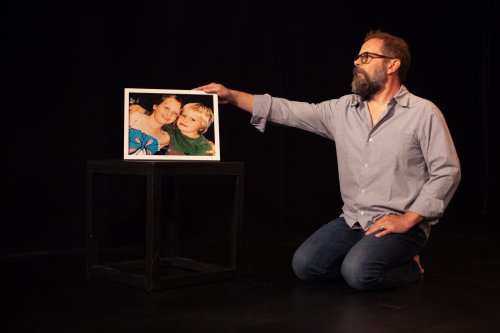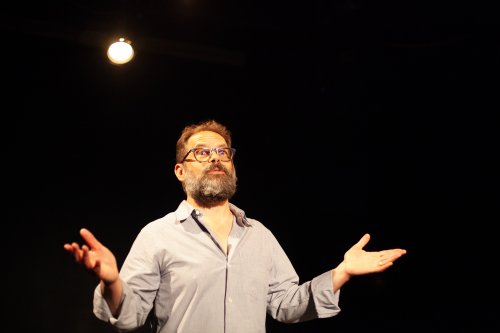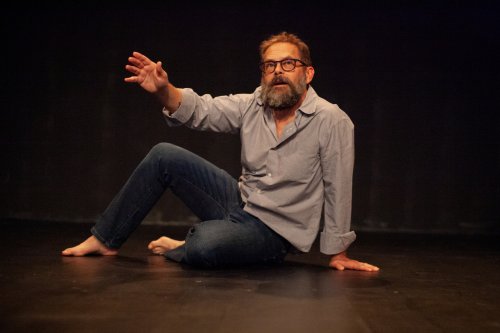Grief: A One Man ShitShow
Colin Campbell has taken his own profound grief and has unselfishly created a piece to get us through our own rough patches - a hug with or without the Kleenex.

Colin Campbell in a scene from his “Grief: A One Man ShitShow in the Studio Theatre at Theatre Row Theatres (Photo credit: Rebecca Asher)
[avatar user=”Tony Marinelli” size=”96″ align=”left”] Tony Marinelli, Critic[/avatar]
Grief is a universal…yes, used here as a noun. A “universal” is defined as a person or thing having universal effect, currency, or application. So in a situation where you encounter grief, either your own or someone else’s, why has it become the norm to respond, “There are no words?” Well, Colin Campbell, the author of Grief: A One Man Shitshow, takes those who will easily coin that phrase to task.
One night in June 2019, Campbell was driving with his wife and two teenage children Ruby and Hart in Joshua Tree, California. Their car was T-boned at 40 mph above the speed limit with the point of impact being the rear passenger door where his daughter was sitting. The driver of the other car was so drunk and high she never even touched her brakes: ninety miles an hour with a prior DUI and a warrant out for her arrest for failure to comply with probation for the previous DUI, without a license, without insurance. Sitting in the audience one thinks this play is not only a detailed dismantling of grief and its process, but the potential for a deep questioning of the existence of God.
Campbell has been a writer and director for theater and film and provides by example how in theater history the dramatic display of tragedy goes all the way back to the ancient Greeks. He tells us they would sit in those very large amphitheaters and watch as many as three full-length tragedies in one sitting, but at least they were followed by an inappropriate, but at least hilarious, satyr play costumed with giant strap-on dildos. In 2023 that costume is the furthest thing from a family-friendly entertainment.
Returning to the phrase “there are no words,” this is what is said to him by adults – friends, neighbors, family and co-workers. Classmates of both of his children were able to cite specific vignettes – thoughtful episodes involving their Ruby and Hart that brought the young mourners closer to the painful experience Campbell and his wife were now enduring, but adults had no words. But aren’t they adults, with a vocabulary and a requisite adult reading level…recent former presidents not included? Campbell and his wife welcomed people who were willing to talk with them about their recently lost children and questioned at what point our culture teaches us to not talk to the grieving. Campbell reminds us, albeit with humor, that saying the wrong thing is probably just as bad as not saying anything. “They’re in a better place” is another phrase that makes no sense to him…how is six feet under in a wooden box better than being in their parents’ arms?

Colin Campbell in a scene from his “Grief: A One Man ShitShow in the Studio Theatre at Theatre Row Theatres (Photo credit: Rebecca Asher)
After serious exploration reading various memoirs on surviving grief and sitting in on the various grief groups, he and his wife realized everyone’s situation is different. Perhaps not vastly, but yes, they are different. He began resenting fellow parents in grief groups if they lost children but still had other children at home. He resented couples that lost their only child but were still young enough to have children. Campbell had a vasectomy after the birth of their second child so Colin and Gail weren’t going to have children of their own again.
Campbell gradually sees that a caste system of sorts reveals itself during grief group: the parents who lost their children to suicide, the parents who lost their children to drugs and alcohol, the parents who lost their children to illness, the parents who lost their children to murder each had their own characteristics. Whose grief is deeper? Whose situation could have been prevented? Those are questions that just can’t be asked. When he sees other parents torturing themselves about what they could have done differently, Campbell admits to second-guessing his own driving that night. What if they left five minutes earlier, or five minutes later, or if they could have not taken that turn…in the end he understands the questions inexplicably put him in an alternate reality where his dead children are still alive.
For the audience, there is an ease of losing sight of the fact that what we are watching is a piece of theatre. Campbell is direct and warm and instructing and sensitive in this piece that he has written. He has the right amount of connection to the material, obviously, as this is a scene from his life, yet he creates the minimal distance from the piece so the audience doesn’t obsess over how maudlin the subject matter is. Instead, the audience can be enlightened by his path.

Colin Campbell in a scene from his “Grief: A One Man ShitShow in the Studio Theatre at Theatre Row Theatres (Photo credit: Rebecca Asher)
In a society, as at present, where we have all bonded over a collective tragedy (let’s say Covid), who among us has not been touched by loss? Who has been fortunate enough to not have grieved? There was a time when grief was so personal. Death notices, especially of those who have been well-known, have always been marked, “we ask everyone to please respect the family’s privacy during this extremely difficult time.” Yet currently on the boards, we have Campbell’s show and Sam Morrison’s Sugar Daddy about surviving the death of his partner post-Covid, Steve Krantz’s When Your Soulmate Has Died about finding out how to go on after a lifetime of devotion to one person, and Anthony Rapp’s Without You detailing the deaths of his own mother after surviving the death of Rent’s composer Jonathan Larson. Suddenly there are a number of creative people who can share some hauntingly beautiful stories about finding strength in their most mournful moments.
Campbell’s director Michael Schlitt very sensitively guides his actor-playwright through very painful memories. One particular moment towards the end of the play, so beautifully staged, allows us to reflect on the one piece of scenic design – a blown-up photo of his two kids together when they were very young that has been on the stage sitting on an end table from the outset of the show. Campbell questions his flip parenting skills – while summering at Campbell’s mother’s house in Maine, he dares his two kids, then aged nine and twelve, to walk a mile at night through the forest to a nearby cemetery to do a grave rubbing. There’s twenty dollars in it for each of them when they come back with their treasure. At some point, Campbell has a “What am I? Crazy?” moment and runs after them to join this makeshift scene out of a horror film. He comes across them nearby happily carrying their grave rubbings. He stays and watches them from behind a tree as they head for home. He muses, “And I thought to myself, my god, my kids are so fucking cool.”
Campbell has written (and performs) a beautiful testament to a father’s love and to a husband and wife’s learning that those we love never truly leave us and there are things that death cannot touch.
Grief: A One-Man ShitShow (through April 16, 2023)
Studio Theatre at Theatre Row Theatres, 410 West 42nd Street, in Manhattan
For tickets, visit http://www.griefaonemanshitshow.com
Running time: 75 minutes without an intermission


Leave a comment